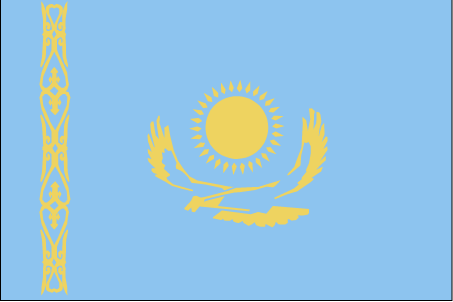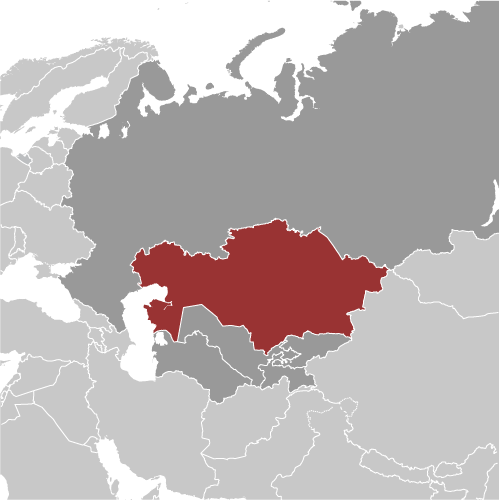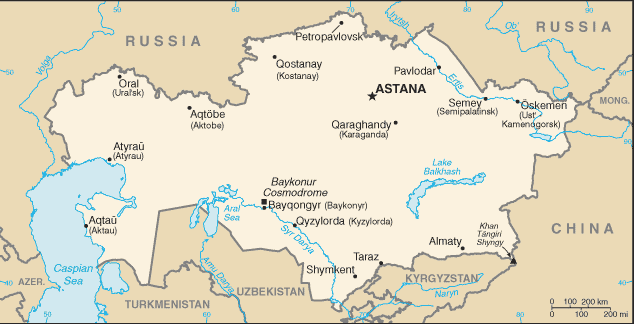Native Kazakhs, a mix of Turkic and Mongol nomadic tribes who migrated into the region in the 13th century, were rarely united as a single nation. The area was conquered by Russia in the 18th century, and Kazakhstan became a Soviet Republic in 1936. During the 1950s and 1960s agricultural "Virgin Lands" program, Soviet citizens were encouraged to help cultivate Kazakhstan's northern pastures. This influx of immigrants (mostly Russians, but also some other deported nationalities) skewed the ethnic mixture and enabled non-Kazakhs to outnumber natives. Independence in 1991 caused many of these newcomers to emigrate. Kazakhstan's economy is larger than those of all the other Central Asian states combined largely due to the country's vast natural resources and a recent history of political stability. Current issues include: developing a cohesive national identity; expanding the development of the country's vast energy resources and exporting them to world markets; achieving a sustainable economic growth; diversifying the economy outside the oil, gas, and mining sectors; enhancing Kazakhstan's competitiveness; and strengthening relations with neighboring states and other foreign powers.
Country Name
Conventional long form:Republic of Kazakhstan
Conventional short form:Kazakhstan
Local long form:Qazaqstan Respublikasy
Local short form:Qazaqstan
Former:Kazakh Soviet Socialist Republic
Government Type
republic; authoritarian presidential rule, with little power outside the executive branch
Capital
Name:Astana
Geographic coordinates:51 10 N, 71 25 E
Time difference:UTC+6 (11 hours ahead of Washington, DC during Standard Time)
note: Kazakhstan is divided into two time zones
Administrative divisions
14 provinces (oblystar, singular - oblys) and 3 cities* (qalalar, singular - qala); Almaty Oblysy, Almaty Qalasy*, Aqmola Oblysy (Astana), Aqtobe Oblysy, Astana Qalasy*, Atyrau Oblysy, Batys Qazaqstan Oblysy [West Kazakhstan] (Oral), Bayqongyr Qalasy [Baykonur]*, Mangghystau Oblysy (Aqtau), Ongtustik Qazaqstan Oblysy [South Kazakhstan] (Shymkent), Pavlodar Oblysy, Qaraghandy Oblysy, Qostanay Oblysy, Qyzylorda Oblysy, Shyghys Qazaqstan Oblysy [East Kazakhstan] (Oskemen), Soltustik Qazaqstan Oblysy (Petropavlovsk), Zhambyl Oblysy (Taraz)
note: administrative divisions have the same names as their administrative centers (exceptions have the administrative center name following in parentheses); in 1995, the Governments of Kazakhstan and Russia entered into an agreement whereby Russia would lease for a period of 20 years an area of 6,000 sq km enclosing the Baykonur space launch facilities and the city of Bayqongyr (Baykonur, formerly Leninsk); in 2004, a new agreement extended the lease to 2050
Independence
16 December 1991 (from the Soviet Union)
National Holiday
Independence Day, 16 December (1991)
Constitution
first post-independence constitution adopted 28 January 1993; new constitution adopted by national referendum 30 August 1995
Legal system
based on Islamic law and Roman law; has not accepted compulsory ICJ jurisdiction
Suffrage
18 years of age; universal
Executive branch
Chief of state: President Nursultan A. NAZARBAYEV (chairman of the Supreme Soviet from 22 February 1990, elected president 1 December 1991)
Head of government:Prime Minister Karim MASIMOV (since 10 January 2007); First Deputy Prime Minister Umirzak SHUKEYEV (since 3 March 2009), Deputy Prime Ministers Yerbol ORYNBAYEV (since 29 October 2007), Aset ISEKESHEV (since 12 March 2010)
Cabinet: Council of Ministers appointed by the president
(For more information visit the World Leaders website)
Elections:president elected by popular vote for a five-year term; election last held on 4 December 2005 (next to be held in 2012); prime minister and first deputy prime minister appointed by the president, with Mazhilis approval; note - constitutional amendments of May 2007 shortened the presidential term from seven years to five years and established a two-consecutive-term limit; changes will take effect after NAZARBAYEV's term ends; he, and only he, is allowed to run for president indefinitely
Election results: Nursultan A. NAZARBAYEV reelected president; percent of vote - Nursultan A. NAZARBAYEV 91.1%, Zharmakhan A. TUYAKBAY 6.6%, Alikhan M. BAYMENOV 1.6%
Legislative branch
bicameral Parliament consists of the Senate (47 seats; 15 members are appointed by the president; 32 members elected by local assemblies; members serve six-year terms, but elections are staggered with half of the members up for re-election every three years) and the Mazhilis (107 seats; 9 out of the 107 Mazhilis members elected by the Assembly of the People of Kazakhstan, a presidentially appointed advisory body designed to represent the country's ethnic minorities; non-appointed members are popularly elected to serve five-year terms)
Elections:Senate - (indirect) last held in October 2008 (next to be held in 2011); Mazhilis - last held on 18 August 2007 (next to be held in 2012)
Election results:Senate - percent of vote by party - NA; seats by party - Nur Otan 16; Mazhilis - percent of vote by party - Nur-Otan 88.1%, NSDP 4.6%, Ak Zhol 3.3%, Auyl 1.6%, Communist People's Party 1.3%, Patriots Party 0.8% Ruhaniyat 0.4%; seats by party - Nur-Otan 98; note - parties must achieve a threshold of 7% of the electorate to qualify for seats in the Mazhilis
Judicial branch
Supreme Court (44 members); Constitutional Council (seven members)
Political Parties and Leaders
Adilet (Justice) [Maksut NARIKBAYEV, Zeynulla ALSHIMBAYEV, Serik ABDRAHMANOV, Bakhytbek AKHMETZHAN, Yerkin ONGARBAYEV, Tolegan SYDYKOV] (formerly Democratic Party of Kazakhstan); Agrarian and Industrial Union of Workers Block or AIST (Agrarian Party and Civic Party); Ak Zhol Party (Bright Path) [Alikhan BAYMENOV]; Alga [Vladimir KOZLOV] (unregistered); Auyl (Village) [Gani KALIYEV]; Azat Party [Bolat ABILOV] (formerly True Ak Zhol Party); Communist Party of Kazakhstan or KPK [Serikbolsyn ABDILDIN]; Communist People's Party of Kazakhstan [Vladislav KOSAREV]; National Social Democratic Party or NSDP [Zharmakhan TUYAKBAY]; Nur-Otan [Bakhytzhan ZHUMAGULOV] (the Agrarian, Asar, and Civic parties merged with Otan); Patriots' Party [Gani KASYMOV]; Rukhaniyat (Spirituality) [Altynshash ZHAGANOVA]
Political pressure groups and leaders
Adil-Soz [Tamara KALEYEVA]; Almaty Helsinki Group [Ninel FOKINA]; Confederation of Free Trade Unions [Sergei BELKIN]; For Fair Elections [Yevgeniy ZHOVTIS, Sabit ZHUSUPOV, Sergey DUVANOV, Ibrash NUSUPBAYEV]; Kazakhstan International Bureau on Human Rights [Yevgeniy ZHOVTIS, executive director]; Pan-National Social Democratic Party of Kazakhstan [Zharmakhan TUYAKBAY]; Pensioners Movement or Pokoleniye [Irina SAVOSTINA, chairwoman]; Republican Network of International Monitors [Dos KUSHIM]; Transparency International [Sergey ZLOTNIKOV]
International organization participation
ADB, CICA, CIS, CSTO, EAEC, EAPC, EBRD, ECO, FAO, GCTU, IAEA, IBRD, ICAO, ICRM, IDA, IDB, IFAD, IFC, IFRCS, ILO, IMF, IMO, Interpol, IOC, IOM, IPU, ISO, ITSO, ITU, MIGA, NAM (observer), NSG, OAS (observer), OIC, OPCW, OSCE, PFP, SCO, UN, UNCTAD, UNESCO, UNIDO, UNWTO, UPU, WCO, WFTU, WHO, WIPO, WMO, WTO (observer), ZC
Diplomatic representation in the US
Chief of mission:Ambassador Yerlan IDRISOV
Chancery:1401 16th Street NW, Washington, DC 20036
Telephone:[1] (202) 232-5488
FAX:[1] (202) 232-5845
Consulate(s) general:Los Angeles
consulate(s): New York
Diplomatic representation from the US
Chief of mission:Ambassador Richard E. HOAGLAND
Embassy:Ak Bulak 4, Str. 23-22, Building #3, Astana 010010
Mailing address:use embassy street address
Telephone:[7] (7172) 70-21-00
FAX:[7] (7172) 34-08-90
Flag description
a gold sun with 32 rays above a soaring golden steppe eagle, both centered on a sky blue background; the hoist side displays a national ornamental pattern "koshkar-muiz" (the horns of the ram) in gold; the blue color is of religious significance to the Turkic peoples of the country, and so symbolizes cultural and ethnic unity; it also represents the endless sky as well as water; the sun, a source of life and energy, exemplifies wealth and plenitude; the sun's rays are shaped like grain, which is the basis of abundance and prosperity; the eagle has appeared on the flags of Kazakh tribes for centuries and represents freedom, power, and the flight to the future










